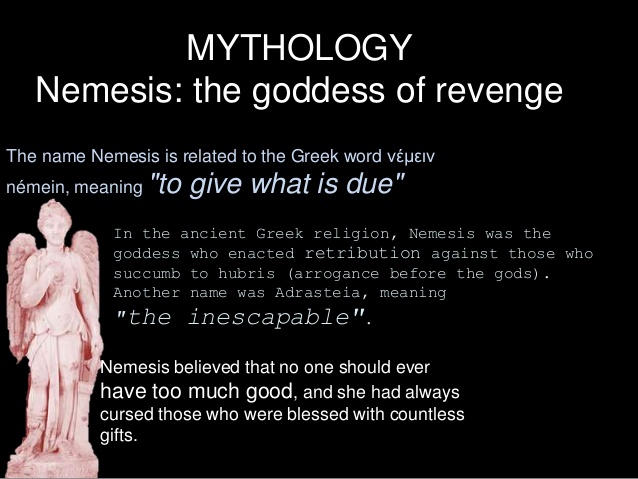What is Karma, Nemesis and Hubris ? how are they related? and how it is being miss placed...
Karma
(in Hinduism and Buddhism) the sum of a person's actions in this and previous states of existence, viewed as deciding their fate in future existences.
Good or bad luck, viewed as resulting from one's actions.
Karma in several Eastern religions is the concept of "action" or "deed", understood as that which causes the entire cycle of cause and effect.
Nemesis

credit
The nemesis of a person or thing is a situation, event, or person which causes them to be seriously harmed, especially as a punishment.
an opponent or enemy that is likely to be impossible for you to defeat, or a situation that is likely to be impossible for you to deal with.
a spirit of divine retribution against those who succumb to hubris
Hubris

credit
defined as "overbearing pride or presumption."
Excessive pride or self-confidence; arrogance.
If you accuse someone of hubris, you are accusing them of arrogant pride.
Hubris (/ˈhjuːbrɪs/, also hybris, from ancient Greek ὕβρις) describes a personality quality of extreme or foolish pride or dangerous overconfidence.[1] In its ancient Greek context, it typically describes behavior that defies the norms of behavior or challenges the gods, and which in turn brings about the downfall, or nemesis, of the perpetrator of hubris.
The adjectival form of the noun hubris is "hubristic". Hubris is usually perceived as a characteristic of an individual rather than a group, although the group the offender belongs to may suffer collateral consequences from the wrongful act. Hubris often indicates a loss of contact with reality and an overestimation of one's own competence, accomplishments or capabilities. Contrary to common expectations,[by whom?] hubris is not necessarily associated with high self-esteem but with highly fluctuating or variable self-esteem, and a gap between inflated self perception and a more modest reality.[citation neede
Karma? Maybe Nemesis Destroys Hubris
These days many people use the word karma as if they actually believe in the causal law shared among many religious traditions of India. Karma has the ethical dimension of the process of rebirth. That theory of salvation concludes that future births and life situations will be conditioned by actions performed during one’s present life, which itself has been conditioned by the accumulated effects of actions performed in previous lives .
In Nigeria, where, according to the Christian Association of Nigeria {CAN} Identification Survey (2008), very large % of the adult population identified themselves as Christians, I find it ironic that people believe in karma, a law of Hinduism, Buddhism, and Sikhism. As far as I know, Christianity does not provide karma as the major motivation to live a moral life. Do Christians who commonly invoke the word karma as just, "godly" revenge even understand what they are saying?
But since so many folks still insist "karma is a bitch that will eventually even the score," I just accept their right to mix religious philosophies. I wonder if they have ever heard of the good old Greek terms hubris and nemesis? Perhaps, it would make us all happy to believe that excessive pride and vanity will be penalized by a higher power.
Lets Dig Deep...
Hubris is defined as "overbearing pride or presumption." As a literary term, hubris stems from Greek tragedy, and the word refers to an excess of ambition and pride, ultimately causing the transgressor's ruin. Hubris usually refers to infractions by mortals against other mortals.
An accusation of hubris often implies that suffering or punishment will follow, similar to the occasional pairing of hubris and nemesis in Greek society. In the Greek tragedies, Nemesis, also known as the goddess Rhamnous, appears chiefly as the inescapable avenger of crime and the punish-er of those who succumb to hubris (arrogance before the gods). She is the spirit of divine retribution.
The word nemesis originally meant the distributor of fortune, neither good nor bad, simply in due proportion to each according to what was deserved; then, nemesis came to suggest the resentment caused by any disturbance of this right proportion, or the sense of justice which could not allow it to pass unpunished.
Originally, in ancient Greek society, hubris had strong connotations toward sexual misconduct and general violence toward others. The category of acts constituting hubris for the ancient Greeks apparently broadened from the original reference to molestation of a corpse or humiliation of a defeated foe to molestation, or outrageous treatment, in general.
Aristotle believed that individuals engaged in these types of behaviors to humiliate victims, with the underlying desire being to make themselves feel superior.
“Hubris consists in doing and saying things that cause shame to the victim…simply for the pleasure of it. Retaliation is not hubris, but revenge. … Young men and the rich are hubris-tic because they think they are better than other people.”
(Paraphrase of Aristotle from Rhetoric)

credit
Hubris Remains
“Hubris calls for nemesis, and in one form or another it's going to get it,
not as a punishment from outside but as the completion of a pattern already started.”
--Mary Midgley, The Myths We Live By
The proverb "pride goeth (goes) before a fall" (from the biblical Book of Proverbs, 16:18) is thought to sum up the modern use of hubris. It is also referred to as "pride that blinds," as it often causes one accused of hubris to act in foolish ways that contradict common sense. In other words, the modern definition may be thought of as, "that pride that goes just before the fall."
Today, hubris is often associated with a lack of humility, though not always with the lack of knowledge. It often indicates a loss of contact with reality and an overestimation of one's own competence, accomplishments or capabilities, especially when the person exhibiting it is in a position of power.
Those accused of hubris often come from higher social backgrounds, such as politicians or wealthy celebrities, than the accuser, who accuses them of having marginal experience with the realities of the topics they attempt to address.

credit
Hubris and Politics
What are the implications of hubris as they relate to politicians with status and celebrity? It seems that hubris thrives in a Congress set in the age of "me." Too many of those we trust to be honest and unselfish statesmen have become unsighted, arrogant officeholders.
Recent research consistent with prior work (Anderson et al., 2006) found evidence suggesting that when the group’s needs dominate; individual group members do indeed perceive their status accurately and do not status self-enhance.
But, so many of our elected officials have lost allegiance to their group, the United States Congress, and, thus, do not serve the citizens of our nation. The hubris of so many politicians destroys group activity. The need to possess status is noble, yet maintaining status in proper balance requires compromise and sincere cooperation with all group members.
Functionalist theories of status argue that status hierarchies provide many benefits for face-to-face groups, including a clear order of influence among group members. However, research affirms that for status hierarchies to provide these benefits, individual group members must be willing to perceive their status accurately -- otherwise the system breaks down.
In such a breakdown, too many group members fight for control over group processes and decisions. Individual pride dominates every action. As in our Congress, the good of the "group" becomes secondary to the allegiance to the political party while party leaders become bloated with self-regard.
On the other hand, for individuals to refrain from engaging status self-enhancement, they must forego the opportunity to boost their self-esteem. On a broader level, group members must address a tension between the group’s need to maintain order and the individuals’ need to maintain a positive sense of self.
(Daniel R. Ames, Samuel D. Gosling, Cameron Anderson. "Punishing Hubris: The Perils of
Overestimating One’s Status in a Group." September 23, 200)
To so many today, image is more important than substance. Yet often acquiring and maintaining a certain image triggers inner hubris and suddenly ambition becomes self absorbed. Then, the intentions of promising heroes succumb to the downfall of pride and appearance. The ego overpowers the superego, the conscience of moral standards and rules, and devotion to the public good is soon forgotten.
Isn't it ironic that those who insist on developing a good reputation, a character that keeps their self-glorification in check, are often openly ridiculed for having quiet, meek profiles? Instead of appreciating those who are steadfast in their taciturn devotion to others, we choose to follow "the voice" that sounds like authority or "the look" that pleasantly fits the dominant fashion.
So, those of you who think people should be punished for their pride might want to think about ancient Greece and call upon nemesis to kick a little ass. That is, if you believe every story should have a moral. The goddess would have a field day in Nija, a place where prideful ambition has reached ungodly proportions and people being killed daily for no just cause,
There is God ooooooooo.

credit
For your Enquires contact

@chuxlouis
© Coindeskbitcoin
WhatsApp: +2348037188995
[email protected]

credit
Success Is Delibrate dear steemains
#MillionairesMindset
KINDLY
UPVOTE
RESTEEM
AND
COMMENT
Follow @chuxlouis





@mrainp420 has voted on behalf of @minnowpond. If you would like to recieve upvotes from minnowpond on all your posts, simply FOLLOW @minnowpond. To be Resteemed to 4k+ followers and upvoted heavier send 0.25SBD to @minnowpond with your posts url as the memo
U skipped De ja wu :D I just followed u, will u please follow me back? Check out my content, u won't regret it
wow that lovely thanx a lot for reminding me,will look that one up too,i just followed u,and if u think the blog is worth it,kindly resteem. lovely ....The term déjà vu is French and means, literally, "already seen." Those who have experienced the feeling describe it as an overwhelming sense of familiarity with something that shouldn't be familiar at all. Say, for example, you are traveling to England for the first time. You are touring a cathedral, and suddenly it seems as if you have been in that very spot before. Or maybe you are having dinner with a group of friends, discussing some current political topic, and you have the feeling that you've already experienced this very thing -- same friends, same dinner, same topic.is not related to the above i discussed but i must say is very interesting.thanx a lot once again.
I keep searching about such things all day. I am doing my research on Illuminati and his importance in different religions
thats a good one ,well done dear cant wait to see your work when you are through,more blessings to you boss.
thank u so much :) stay connected bro. i really need ur support
of course i am with you dear ..more blessings.
Resteemed to over 4700 followers and 100% upvoted. Thank you for using my service!
Read here how the new bot from Berlin works.
@resteem.bot